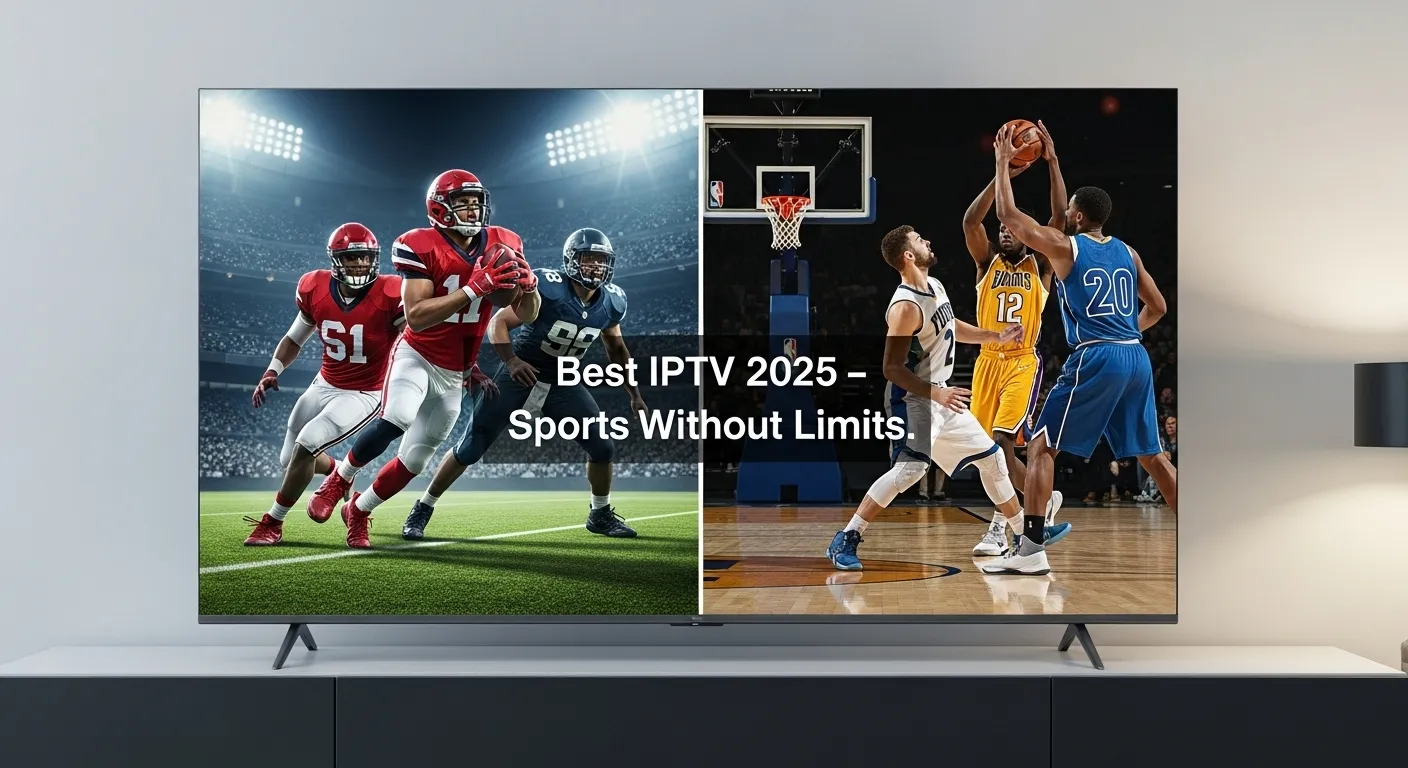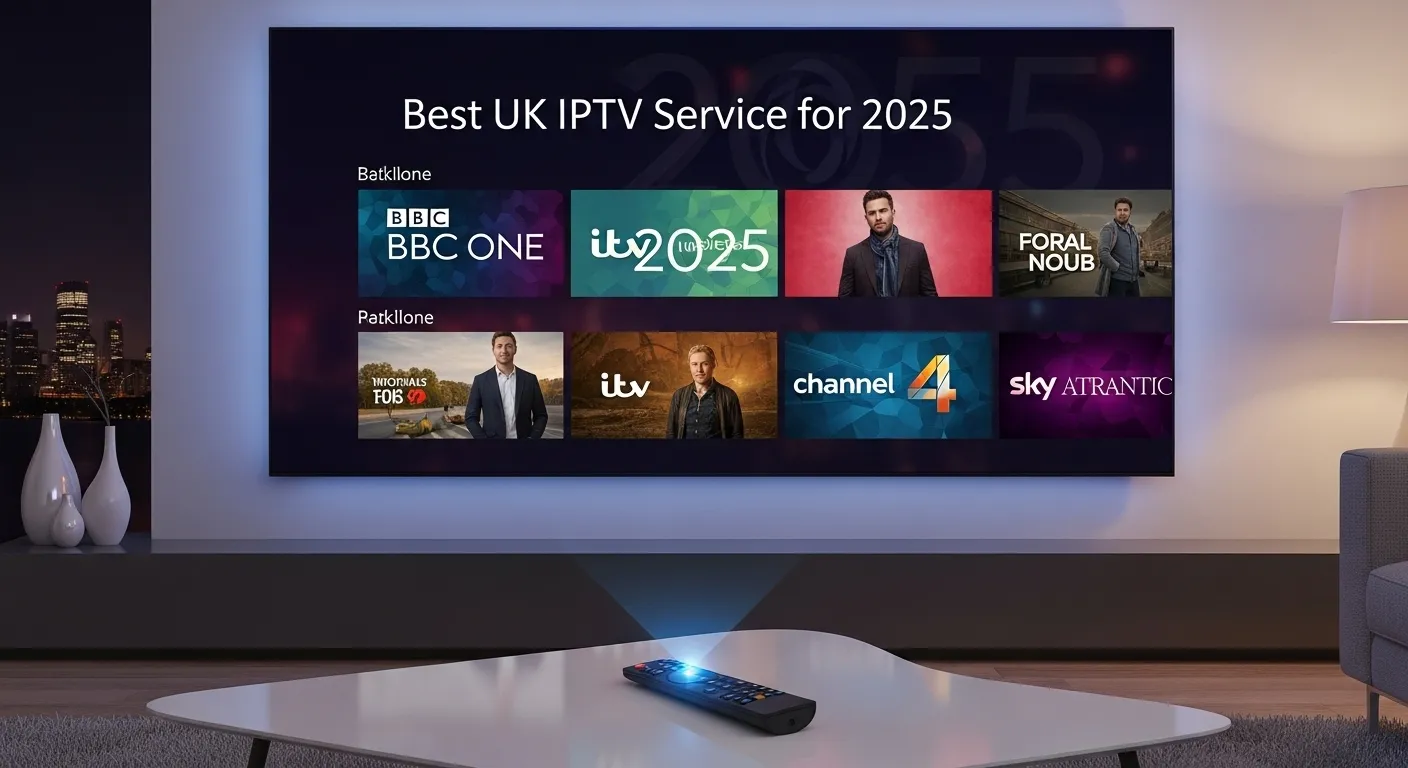Best IPTV 2025 offers unique opportunities for those who have cut the cord and are looking for HD and 4K streaming experiences. IPTV services now provide:
- Wide selection of channels with thousands of live options
- Clear video quality supporting up to 4K resolution
- Flexible pricing plans starting as low as $8 per month
- Compatibility across multiple devices including smartphones, tablets, smart TVs, and streaming devices
- Extensive libraries of on-demand content with hundreds of thousands of titles
Traditional cable providers are finding it difficult to compete with the affordability and convenience of IPTV. While cable subscriptions often cost over $100 per month with limited flexibility, IPTV services offer similar or better content at a much lower price.
This detailed guide delves into the best IPTV options for 2025, looking at both legitimate services and third-party providers. We’ll examine important factors such as streaming quality, device compatibility, and pricing models to assist you in making an informed choice. Whether you’re interested in sports coverage, international channels, or premium movie content, Yeah IPTV and other top providers have solutions that cater to your viewing preferences and budget needs.
Understanding IPTV Technology
IPTV technology is changing the way we watch TV. Instead of using traditional methods like cable or satellite, IPTV delivers live TV channels and on-demand content directly through your internet connection. This means no more messy cables or bulky satellite dishes—just a simple, streamlined entertainment experience.
How Does IPTV Work?
Internet Protocol Television (IPTV) works by converting video and audio signals into digital data packets. These packets travel over your broadband network to reach your viewing device, whether it’s a smart TV, streaming box, or mobile device. With IPTV, you can enjoy high-quality streaming without being tied down to specific channels or expensive equipment.
IPTV vs. Traditional Television
The main difference between IPTV and conventional television lies in how the content is delivered. Here’s a breakdown of the key distinctions:
| Aspect | IPTV | Traditional Television |
| Delivery Method | Internet connection | Cable or satellite broadcast |
| Infrastructure | Uses existing broadband network | Requires dedicated infrastructure |
| Channel Packages | Flexible, with access to international content | Fixed packages offered by providers |
| Monthly Costs | Typically lower costs | Higher costs ranging from $50-$150 |
As you can see, IPTV offers several advantages over traditional television services. By leveraging your internet connection, IPTV provides enhanced reliability, extensive channel variety, competitive pricing, and flexible viewing options.
Key Benefits of IPTV
Here are some of the reasons why many people are making the switch to IPTV:
- Enhanced reliability: Stable broadband networks ensure uninterrupted streaming.
- Extensive channel variety: Access to international content expands your viewing choices.
- Competitive pricing: Third-party providers offer affordable plans starting as low as $8-$25 monthly.
- Flexible viewing options: Enjoy catch-up TV and video-on-demand libraries for added convenience.
Infrastructure Requirements for Optimal Performance
To fully enjoy the benefits of IPTV, it’s important to have a strong technical setup in place. Here are the key infrastructure requirements for optimal performance:
- Internet Connection: Your internet connection is the backbone of IPTV streaming. For HD content, you’ll need a minimum bandwidth of 15-25 Mbps, while 4K content requires 25+ Mbps for smooth playback.
- Streaming Devices: Ensure that you have compatible devices for streaming IPTV. Some popular options include:
- Amazon Firestick and Fire TV
- Android TV boxes and smart TVs
- Apple TV and Roku devices
- Smartphones and tablets
Most IPTV services require dedicated player applications to access their content libraries. These apps decode incoming data streams and present them as watchable television programming on your chosen device.
Yeah IPTV is an example of how modern IPTV providers optimize their services across multiple platforms, ensuring consistent performance regardless of your preferred streaming device.
Exploring Different Categories of IPTV Services in 2025

The IPTV landscape in 2025 presents consumers with two distinct pathways for accessing streaming content, each offering unique advantages and considerations. Understanding these categories helps viewers make informed decisions based on their specific needs, budget constraints, and content preferences.
1. Verified/Legal IPTV Services
Legal IPTV services represent the mainstream approach to internet-based television, providing viewers with legitimate, regulated streaming experiences. These verified IPTV platforms operate through official channels and maintain partnerships with content creators and broadcasters.
Accessibility and Legitimacy
These services appear in official app stores across all major platforms, including Google Play Store, Apple App Store, Amazon Appstore, and Roku Channel Store. This official distribution ensures automatic updates, security patches, and compliance with platform standards. Users can download and install these applications without concerns about malware or unauthorized software.
Content Quality and Channel Lineups
Verified services deliver HD and 4K streaming through robust content delivery networks, ensuring consistent picture quality and minimal buffering. Channel lineups typically feature:
- Major broadcast networks (ABC, CBS, NBC, FOX)
- Premium cable channels (ESPN, CNN, HGTV, Discovery)
- Regional sports networks
- Local affiliate stations
- International channels in select packages
Premium Features
Legal platforms distinguish themselves through comprehensive feature sets:
- Unlimited DVR storage allowing users to record multiple shows simultaneously
- Multi-device support enabling streaming across smartphones, tablets, smart TVs, and streaming devices
- Cloud-based viewing history and personalized recommendations
- Parental controls and content filtering options
- Live pause and rewind functionality
Pricing Structure
The cost of legal IPTV services ranges from $28 to $83 monthly, reflecting the premium nature of licensed content and advanced features. This pricing includes:
- YouTube TV: Offers 100+ channels including major networks and sports channels at $72.99/month
- Sling TV: Provides affordable packages starting at $40/month with 45+ channels
- Hulu Live TV: Combines live television with on-demand content at $76.99/month
2. Unverified/Third-Party IPTV Services
Third-party IPTV services operate outside the traditional app store ecosystem, offering a dramatically different approach to streaming entertainment. These platforms distinguish themselves through their massive content libraries, with some providers delivering access to over 30,000 live channels spanning international networks, regional broadcasts, and niche programming rarely found on verified platforms.
The video-on-demand libraries associated with these services often exceed 150,000 titles, encompassing movies, TV series, documentaries, and specialized content from multiple countries and languages. This extensive catalog appeals to viewers seeking diverse entertainment options beyond mainstream offerings.
Installation Requirements and Accessibility
Unlike legal IPTV services, third-party providers require manual installation of specialized apps or APK files. Users must download these applications directly from provider websites or third-party sources, as they remain unavailable through official app stores like Google Play or Apple’s App Store. This installation process typically involves enabling “unknown sources” on Android devices or using sideloading techniques on streaming devices.
Cost-Effective Pricing Structure
The pricing advantage represents a significant draw for budget-conscious consumers. Monthly subscriptions typically range from $8 to $25, making these services substantially more affordable than verified alternatives. Many providers offer flexible payment options, including cryptocurrency transactions for enhanced privacy.
Popular third-party services like Yeah IPTV, recognized as one of the best subscriptions IPTV provider, often include features such as buffer-free streaming technology, multi-device connections supporting 1-5 simultaneous streams, and comprehensive electronic program guides. These platforms frequently provide pay-per-view events, adult content, local channels, and catch-up TV functionality not commonly available through traditional streaming services.
Popular Third-Party Providers in 2025
The third-party IPTV market has several standout providers known for their wide range of services and technical expertise.
1. Krooz TV
Krooz TV stands out with its impressive buffer-free streaming technology, delivering consistent HD and 4K quality across its extensive channel lineup. This provider supports up to 5 simultaneous connections, making it ideal for households with multiple viewing preferences.
2. Apollo Group TV
Apollo Group TV sets itself apart with its strong compatibility across multiple devices and extensive sports coverage, including premium pay-per-view events. The service is known for its reliable uptime and quick customer support through live chat assistance.
3. CatchON TV
CatchON TV is another notable provider with its easy-to-use interface and comprehensive Electronic Program Guide (EPG). The platform offers flexible subscription plans ranging from monthly to annual options, with cryptocurrency payment methods for added privacy.
Yeah IPTV is one of the top subscription IPTV providers, offering competitive pricing structures and extensive VOD libraries that cater to diverse entertainment preferences. These providers usually offer free trial periods ranging from 24 hours to several days, allowing potential subscribers to assess service quality before committing to longer-term subscriptions.
Essential Features to Consider for Optimal Streaming Experience with Best IPTV Services in 2025
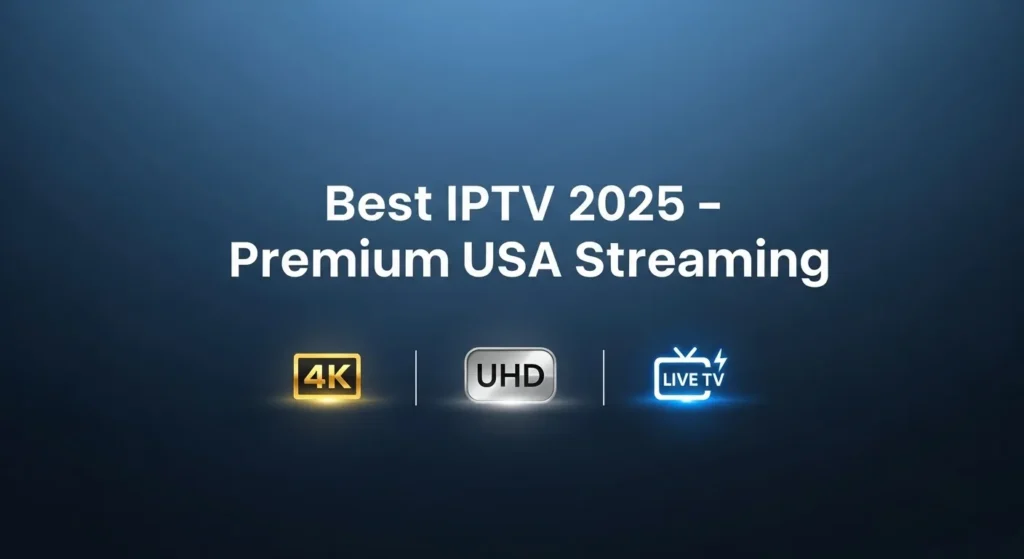
Modern viewers demand exceptional quality when selecting their streaming platform. HD streaming quality and 4K streaming quality represent the baseline expectations for any premium IPTV service. These ultra-high-definition capabilities transform your viewing experience, delivering crystal-clear picture resolution that rivals traditional broadcast television while maintaining consistent frame rates during peak usage hours.
Multi-Device Support
Multi-device support has become indispensable for today’s connected households. The Best IPTV 2025 | Top IPTV Services for HD & 4K Streaming excel at providing seamless compatibility across:
- Smart TVs and streaming devices (Amazon Firestick, Android boxes)
- Smartphones and tablets for on-the-go viewing
- Desktop computers and laptops
- Gaming consoles with streaming capabilities
Buffer-Free Streaming Technology
Buffer-free streaming technology represents a game-changing advancement in IPTV delivery. Antifreeze solutions prevent the frustrating interruptions that plagued earlier streaming platforms, ensuring smooth playback even during high-traffic periods. Leading providers like Yeah IPTV implement sophisticated server infrastructure to maintain consistent stream quality without freezing or lag.
Comprehensive Electronic Program Guides (EPG)
Comprehensive Electronic Program Guides (EPG) enhance user navigation by providing detailed scheduling information, program descriptions, and personalized recommendations. These intelligent guides allow viewers to plan their entertainment schedule and discover new content effortlessly.
Privacy Protection through VPN Compatibility
Privacy protection through VPN compatibility addresses growing security concerns among streaming enthusiasts. Reputable IPTV services support VPN connections, enabling users to maintain anonymity while accessing their favorite channels and protecting personal data from potential threats.
Customer Support Availability
Customer support availability distinguishes premium services from budget alternatives. Round-the-clock assistance through multiple channels ensures users receive immediate help when technical issues arise:
- Live chat support for instant problem resolution
- Phone support for complex technical guidance
- Email ticketing systems for detailed inquiries
- Comprehensive FAQ sections and video tutorials
These essential features collectively determine whether an IPTV service delivers professional-grade entertainment or falls short of modern streaming standards.
Making an Informed Choice: Free vs. Paid IPTV Platforms in 2025
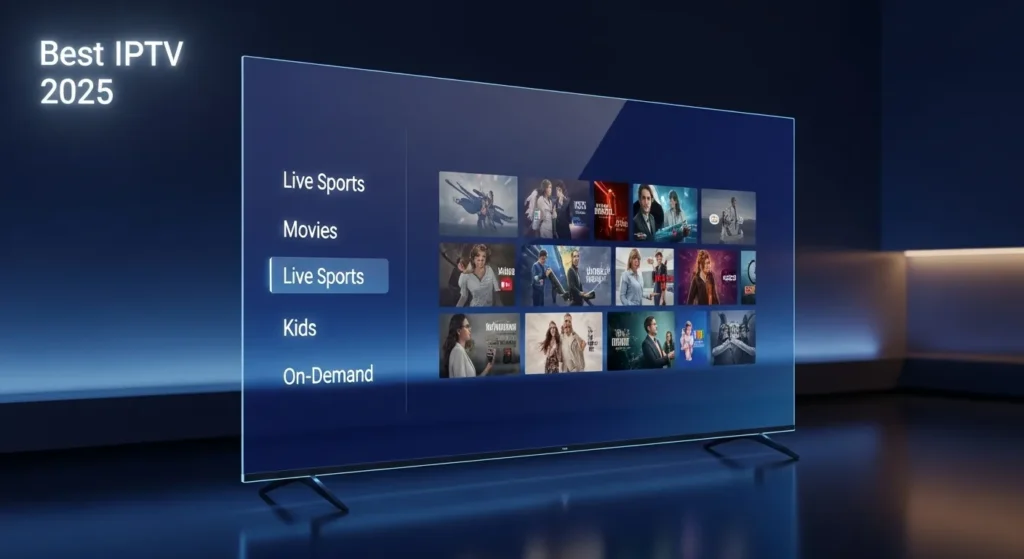
Free IPTV platforms like Pluto TV and Xumo have gained significant traction among budget-conscious viewers seeking entertainment without monthly subscriptions. These ad-supported channels deliver a curated selection of content ranging from news and movies to specialized programming across various genres.
Free Platform Limitations
Pluto TV offers approximately 250+ channels with content spanning movies, TV shows, news, and niche categories. The platform generates revenue through strategically placed advertisements, creating natural viewing interruptions every 8-12 minutes. Xumo provides similar functionality with around 190+ free channels, featuring content from major networks and independent producers.
Key restrictions of free platforms include:
- Limited premium network access
- Frequent commercial interruptions
- Restricted on-demand libraries
- Basic streaming quality (typically 720p-1080p)
- No DVR functionality
- Limited customer support options
Premium Service Advantages
Paid vs free IPTV services reveal substantial differences in user experience and content quality. Premium providers like Yeah IPTV deliver extensive channel lineups exceeding 30,000+ live channels with comprehensive 4K streaming capabilities.
Premium subscriptions typically include:
- Uninterrupted streaming without advertisements
- Extensive VOD libraries containing 150,000+ titles
- Multiple device connections (1-5 simultaneous streams)
- Premium sports channels including PPV events
- International content from global broadcasters
- 24/7 customer support via live chat and phone
- Advanced EPG features with personalized recommendations
The monthly investment of $8-$25 for third-party services or $28-$83 for verified platforms provides significantly enhanced viewing experiences compared to free alternatives, making paid subscriptions worthwhile for serious streaming enthusiasts.
Setting Up Your Chosen IPTV Service for Optimal Performance
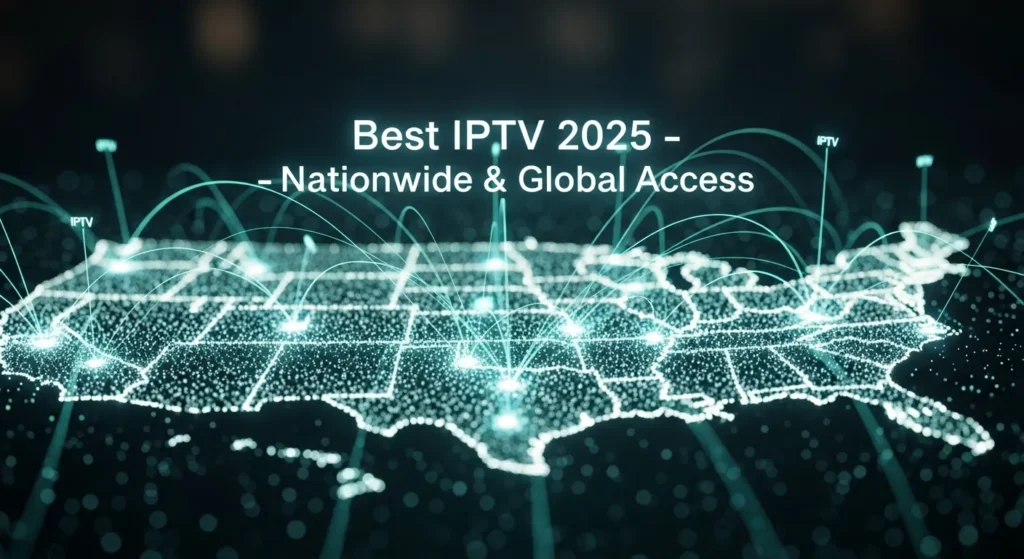
Getting your IPTV service running smoothly requires careful attention to several technical components that work together to deliver seamless streaming.
Internet Connection Requirements
Your streaming quality depends entirely on your internet speed. Test your connection using speed test tools to ensure you meet these minimum requirements:
- HD streaming: 15-20 Mbps download speed
- 4K streaming: 25+ Mbps download speed
- Multiple devices: Add 10 Mbps per additional simultaneous stream
Contact your internet service provider to upgrade your plan if current speeds fall short. Ethernet connections provide more stability than Wi-Fi for stationary devices.
Device Selection and Compatibility
Choose streaming devices that support your selected IPTV service’s technical specifications:
Popular Compatible Devices:
- Amazon Fire TV Stick 4K Max
- NVIDIA Shield TV Pro
- Android TV boxes (Mi Box S, Chromecast with Google TV)
- Smart TVs with Android TV or webOS
- iOS/Android smartphones and tablets
Verify your chosen device supports the video codecs (H.264, H.265) and resolution formats offered by your IPTV provider.
App Installation Process
For Legal IPTV Services: Download apps directly from official stores (Google Play Store, Amazon Appstore, Apple App Store). Sign in with your subscription credentials to access content immediately.
For Third-Party Services: Enable “Unknown Sources” in device security settings, then sideload IPTV player applications like IPTV Smarters Pro, TiviMate, or Perfect Player. Input your provider’s M3U playlist URL and EPG information during setup.
VPN Configuration for Enhanced Security
Install a reliable VPN service before streaming to protect your privacy and bypass geographical restrictions. Configure the VPN to connect automatically when launching IPTV apps. Yeah IPTV recommends using VPN services with fast servers optimized for streaming to maintain optimal performance while ensuring security.
Future Trends Shaping the Landscape of IPTV Streaming Beyond 2025
The IPTV industry continues evolving at a rapid pace, with antifreeze technology buffering prevention emerging as a game-changing innovation. This advanced technology eliminates the frustrating interruptions that have historically plagued streaming services, ensuring seamless viewing experiences even during peak usage hours. Leading providers like Yeah IPTV are already implementing these solutions to deliver uninterrupted HD and 4K content.
EPG Advancements
EPG advancements represent another significant development reshaping the streaming landscape. Modern Electronic Program Guides now incorporate artificial intelligence to analyze viewing patterns and deliver personalized content recommendations. These intelligent systems learn user preferences, suggesting relevant shows, movies, and live events based on individual viewing history and demographic data.
Flexible Subscriptions
The future of IPTV also includes revolutionary flexible subscriptions that adapt to changing consumer needs. Instead of rigid monthly plans, providers are introducing dynamic pricing models that adjust based on actual usage, seasonal viewing patterns, and content preferences. This approach allows subscribers to pay only for the channels and features they actively use.
Enhanced Integration Capabilities
Enhanced integration capabilities are transforming how IPTV services connect with smart home ecosystems. Voice-activated controls, automated recording schedules, and cross-platform synchronization create more intuitive user experiences. These technological improvements position IPTV as the definitive replacement for traditional broadcasting methods, offering unprecedented convenience and customization options for modern viewers seeking premium entertainment solutions.
Conclusion
Choosing the best IPTV service for your streaming needs requires careful evaluation of your specific requirements and priorities. Whether you prioritize extensive channel lineups, 4K streaming quality, budget-friendly pricing, or premium features like unlimited DVR, the IPTV landscape in 2025 offers solutions for every viewer.
Legal services provide reliability and peace of mind through official app store availability, while third-party providers deliver exceptional value with vast content libraries at competitive prices. Consider these key factors when making your decision:
- Streaming quality: HD and 4K capabilities for optimal viewing experience
- Device compatibility: Multi-platform support across your preferred devices
- Privacy and security: VPN integration for protected streaming sessions
- Customer support: 24/7 assistance availability
- Pricing structure: Subscription plans that align with your budget
For those seeking premium third-party options with extensive channel selections and reliable performance, Yeah IPTV stands out as the best subscription IPTV provider, offering comprehensive features and exceptional streaming quality.
The right IPTV service transforms your entertainment experience, delivering personalized content access that traditional cable simply cannot match.
FAQs (Frequently Asked Questions)
What is IPTV technology and why is it becoming popular in 2025?
IPTV (Internet Protocol Television) technology delivers television content over the internet using Internet Protocol, replacing traditional cable and satellite TV. In 2025, its popularity grows due to flexible streaming options, HD and 4K quality, diverse channel selections, and cost-effective pricing compared to conventional TV services.
What are the differences between verified/legal IPTV services and third-party IPTV services?
Verified/legal IPTV services are available through official app stores, offering reliable access to popular channels in HD/4K with features like unlimited DVR and multi-device support, typically priced between $28-$83/month. Third-party IPTV services provide vast channel libraries (up to 30,000+ live channels) and extensive on-demand content at lower prices ($8-$25/month), but require manual app installation and may lack official legitimacy.
Which devices and internet speeds are recommended for optimal IPTV streaming in 2025?
For the best IPTV experience in 2025, a high-speed internet connection of at least 15-25 Mbps is recommended. Compatible streaming devices include Amazon Firestick, Android TV boxes, smart TVs, smartphones, and tablets. Using dedicated IPTV player apps enhances performance and supports HD and 4K streaming quality.
What essential features should I look for when choosing the best IPTV service for HD & 4K streaming?
Key features include high-definition (HD) and ultra-high-definition (4K) streaming capabilities for crisp visuals; multi-device support allowing simultaneous viewing on TVs, smartphones, and tablets; buffer-free streaming technologies such as antifreeze solutions; comprehensive Electronic Program Guides (EPG); strong privacy measures including VPN compatibility; and responsive customer support with live chat or phone assistance.
How do free IPTV platforms compare to paid IPTV services in 2025?
Free IPTV platforms like Pluto TV and Xumo offer ad-supported channels with limited selections suitable for casual viewers. In contrast, paid IPTV services provide extensive channel lineups, superior stream quality including HD/4K options, advanced features like unlimited DVR storage, multi-device access, and enhanced privacy protections—making them ideal for users seeking premium viewing experiences.
What future trends are shaping the IPTV streaming landscape beyond 2025?
Emerging trends include antifreeze buffering prevention technology that minimizes interruptions during streaming; flexible subscription models tailored to user preferences; advanced Electronic Program Guides (EPG) with personalized recommendations enhancing navigation; and ongoing improvements in privacy and security features to protect viewer data—all contributing to a more seamless and customized IPTV experience.

